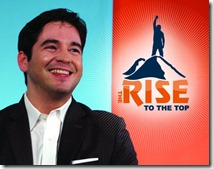 Dr. Dave Chaffey is CEO and co-founder of Smart Insights, an online publisher who provide guides, templates and training to help businesses succeed online. Dave has worked with a number of companies including 3M, BP, HSBC. He is author of 5 bestselling books on Ecommerce including Internet Marketing: Strategy, Implementation and Practice which was first published in 2000. Dave has been recognised by the Chartered Institute of Marketing as one of 50 marketing ‘gurus’ worldwide who have shaped the future of Marketing. You can follow Dave on LinkedIn or Twitter. Read the full story
Dr. Dave Chaffey is CEO and co-founder of Smart Insights, an online publisher who provide guides, templates and training to help businesses succeed online. Dave has worked with a number of companies including 3M, BP, HSBC. He is author of 5 bestselling books on Ecommerce including Internet Marketing: Strategy, Implementation and Practice which was first published in 2000. Dave has been recognised by the Chartered Institute of Marketing as one of 50 marketing ‘gurus’ worldwide who have shaped the future of Marketing. You can follow Dave on LinkedIn or Twitter. Read the full story
Tag Archive | "interviews"
Interview with Social Media Influencer: Dr. Dave Chaffey
Posted on 01 June 2011.
Posted in CEOs, Interviews, Top InterviewsComments Off on Interview with Social Media Influencer: Dr. Dave Chaffey
Interview with Social Media Influencer: Tamara Littleton
Posted on 09 June 2011.
 Tamara Littleton is CEO of eModeration, a moderation and community management company which works directly with worldwide advertising agencies, third sector clients and media brands including MTV, ITV, 02, Nokia and ESPN as well as leading agencies like Ogilvy, Saatchi & Saatchi, Euro RSCG, Wieden and Kennedy and Publicis. Tamara recently worked with UKCCIS to revise its guidelines on moderation of communities to help safeguard children. She regularly speaks at conferences and contributes white papers to aid learning and development within the social media industry. You can follow Tamara on Twitter, Linkedin or Facebook. Read the full story
Tamara Littleton is CEO of eModeration, a moderation and community management company which works directly with worldwide advertising agencies, third sector clients and media brands including MTV, ITV, 02, Nokia and ESPN as well as leading agencies like Ogilvy, Saatchi & Saatchi, Euro RSCG, Wieden and Kennedy and Publicis. Tamara recently worked with UKCCIS to revise its guidelines on moderation of communities to help safeguard children. She regularly speaks at conferences and contributes white papers to aid learning and development within the social media industry. You can follow Tamara on Twitter, Linkedin or Facebook. Read the full story
Posted in CEOs, Interviews, Top InterviewsComments Off on Interview with Social Media Influencer: Tamara Littleton
Interview with Community Manager: Zack King from RPM
Posted on 21 March 2012.
 Zack King is a Community Manager at RPM, working across a number of brands such as Captain Morgan, J&B and Clover. Zack started his career in community management at All-Leo, where he was responsible for the social media accounts for a number of popstars, such as Cheryl Cole, Leona Lewis and Take That. You can follow Zack on Linkedin or Twitter. Read the full story
Zack King is a Community Manager at RPM, working across a number of brands such as Captain Morgan, J&B and Clover. Zack started his career in community management at All-Leo, where he was responsible for the social media accounts for a number of popstars, such as Cheryl Cole, Leona Lewis and Take That. You can follow Zack on Linkedin or Twitter. Read the full story
Posted in Community Managers, InterviewsComments Off on Interview with Community Manager: Zack King from RPM
Interview with Community Manager: Shruti Shah Goradia from Kodak
Posted on 10 October 2011.
 Shruti Goradia is the Social Media Community Manager for Kodak’s Tips & Projects Exchange: a branded community for creative enthusiasts. In this role she manages all aspects of the community to drive business goals. Shruti leads the strategy for reach, influence and impact via owned, earned and paid media, which drives product integration to optimize brand loyalty, customer satisfaction and revenue. She is proud to be on the front lines of interacting with Kodak consumers, championing community and customer feedback internally. You can follow Shruti on Twitter, Facebook or Linkedin. Read the full story
Shruti Goradia is the Social Media Community Manager for Kodak’s Tips & Projects Exchange: a branded community for creative enthusiasts. In this role she manages all aspects of the community to drive business goals. Shruti leads the strategy for reach, influence and impact via owned, earned and paid media, which drives product integration to optimize brand loyalty, customer satisfaction and revenue. She is proud to be on the front lines of interacting with Kodak consumers, championing community and customer feedback internally. You can follow Shruti on Twitter, Facebook or Linkedin. Read the full story
Posted in Community Managers, InterviewsComments Off on Interview with Community Manager: Shruti Shah Goradia from Kodak
Interview with Community Manager: Morgan Clark from Channel 4
Posted on 24 January 2012.
Morgan is a Community and Social Media producer with Channel 4 who also works on community and social media strategies at Mondo Management who represent talents like Orbital, David Gray, Lisa Hannigan, Ruarri Joseph and Pixie Carnation. Previously he was Assistant Communities Editor at Associated Northcliffe Digital. You can follow Morgan on Twitter and Linkedin.
Posted in Community Managers, InterviewsComments Off on Interview with Community Manager: Morgan Clark from Channel 4
Interview with Social Media Manager: Hristina Hristova from Acronis
Posted on 07 February 2012.
 Hristina Hristova is currently working for Acronis as a global social media manager for consumer products. Hristina’s background is in social media and publishing – Hristina was a founding member of Groupon UK, and worked for the social buying giant as a social media strategist. Hristina’s interests include all things digital, web and graphic design, as well as typography. You can follow Hristina on Twitter, Linkedin and Pinterest . Read the full story
Hristina Hristova is currently working for Acronis as a global social media manager for consumer products. Hristina’s background is in social media and publishing – Hristina was a founding member of Groupon UK, and worked for the social buying giant as a social media strategist. Hristina’s interests include all things digital, web and graphic design, as well as typography. You can follow Hristina on Twitter, Linkedin and Pinterest . Read the full story
Posted in Interviews, Social Media ManagersComments Off on Interview with Social Media Manager: Hristina Hristova from Acronis
CEO Today: Interview with the co-founder of Flip.to – Brian J. Kent
Posted on 29 June 2011.
 Brian is the co-founder and product lead of Flip.to. He’s been breathing life into web products for over 10 years as a hybrid developer/designer. As a Brooklyn-born, engineer by schooling, world traveler by preference, visionary by self-proclamation, Brian is a proponent of social media, travel and new technology bridging the two. You can follow Brian on Twitter and Linkedin.
Brian is the co-founder and product lead of Flip.to. He’s been breathing life into web products for over 10 years as a hybrid developer/designer. As a Brooklyn-born, engineer by schooling, world traveler by preference, visionary by self-proclamation, Brian is a proponent of social media, travel and new technology bridging the two. You can follow Brian on Twitter and Linkedin.
G: Tell us a little about your start-up?
B: Flip.to is a platform that helps hotels & restaurants earn new guests by turning their current guests into a huge team of trusted advocates.
Here’s an example of how it works for hotels. After a guest books a room, Flip.to incentivizes them to spread the word about their upcoming trip and where they’ll be staying. So if you’ve just booked a room at The James Chicago, you’ll earn a complimentary room upgrade certificate in all of two clicks. And the hotel just reached all of your friends, family & followers in a really natural way- boosting brand awareness and deepening their pool of potential future guests.
Just as Flip.to engages hotel guests at convenient touch points (like at time of booking, suggestions when they arrive, a quick review after their stay), Flip.to engages restaurant guests right from their table on their own mobile device. Restaurants learn who their guests are, incentivize happy ones to spread the word, make a personalized connection with their friends and get negative reviews turned into real-time alerts for staff- all in a few swipes and taps.
G: What were the biggest obstacles launching the start-up and how did you overcome them?
B: Like most start-ups, our biggest challenge was getting past that initial inertia when you’re sitting there with only a glimmer of a product and zero customers. Because once the ball is rolling (when you have customers), it becomes easier to build on that traction- both in terms of landing new customers and figuring out what the product should grow up to be.
We started talking to folks in the hospitality industry really early on in the product development process to get their take on what we were doing. It helped validate the direction Flip.to was headed, build some excitement and it’s how we landed one of our very first proponents, who is now heading up our business development. Even before Flip.to was ready to go live, we had signed our first (paying!) beta client.
G: Where should social media be integrated by start-ups? (marketing, customer service and etc)? What are the best ways to do that?
B: Every company needs to take a good look at what their goals are and then match those up to how social media can help- there’s no one-fit solution. For start-ups, doing that is especially important because resources are scarce.
For consumer-oriented start-ups, social media makes sense for customer service provided you can be responsive. But if you’re going to make public the good and the bad about what your customers are saying, you better be on top of it. People don’t expect perfection, things happen, but you can lose credibility if it looks like you’re being unresponsive to issues. For B2B, you should respond directly and give your beta clients direct access to the team.
Using social media for marketing makes lots of sense. Only in the past few years, has it been amazingly easy to reach a large number of people. And social media becomes particularly potent, when folks are pushing out messages about your product or service on their own existing social networks. Flip.to is all about this- the hotels and restaurants using it can reach far beyond their own network by tapping into their guests’ networks, which collectively becomes massively bigger. And hearing something from a friend is always going to be more trusted than from a PR or marketing person.
G: Which social media sites do bring the most value to your start-up?
B: At Flip.to, we’ve found that Facebook has been the most popular place for our hotel’s guests to post about their upcoming trip. It has also generated the most traffic back to the hotel’s site, in terms of visitors and real action. Twitter isn’t far behind, followed by LinkedIn.
G: What are your favourite social media campaigns created by start-ups?
B: You’ll always get my attention if you can make me laugh out loud. Betabrand is a young online clothing company that is proving hilarious, well-written copy is sometimes all you need to get people buzzing. Their “privates” underwear that “promises to block TSA employees from seeing your scanned junk” is a good example of that.
The best social media campaigns feel authentic and for me personally, a little wit goes a long way.
G: What is the funniest/most unexpected thing that happened while developing your startup?
B: The very first incarnation of Flip.to (pre-beta) was to help companies spread the word about new products or services with the help of their employees and customers. We got lots of interesting feedback but as we were kicking ideas around, it felt far more natural for folks to talk about their travel experiences. Plus the marketing budgets for boutique hotels and destination restaurants were hurting after the downturn- helping them turn their guests into advocates just made sense.
A big Thank You to Brian for his great insights!! You can find the rest of the CEO Today interviews at Social Media interviews category.
Posted in NewsComments Off on CEO Today: Interview with the co-founder of Flip.to – Brian J. Kent
Interview with Social Media Citizen: David Siteman Garland
Posted on 05 October 2010.
 David Siteman Garland is the Founder of The Rise To The Top, the web show for entrepreneurs, forward-thinkers, business owners and marketers, as well as The Rise To The Top TV show on ABC. David contributes as a writer and business/entrepreneurial commentator to CNN, CBS Bnet, Small Biz Trends and Personal Branding Blog. David is also the author of upcoming book – Smarter, Faster, Cheaper: Non-Boring, Fluff-free Strategies for Marketing and Promoting Your Business. You can follow David on Twitter or Facebook. Read the full story
David Siteman Garland is the Founder of The Rise To The Top, the web show for entrepreneurs, forward-thinkers, business owners and marketers, as well as The Rise To The Top TV show on ABC. David contributes as a writer and business/entrepreneurial commentator to CNN, CBS Bnet, Small Biz Trends and Personal Branding Blog. David is also the author of upcoming book – Smarter, Faster, Cheaper: Non-Boring, Fluff-free Strategies for Marketing and Promoting Your Business. You can follow David on Twitter or Facebook. Read the full story
Posted in Top InterviewsComments (1)
Interview with Social Media Citizen: Paul Dunay
Posted on 28 September 2010.
 Paul Dunay is Global Managing Director of Services and Social Marketing for Avaya, a global leader in enterprise communications, and author of 3 Dummies books: Facebook Marketing for Dummies, Social Media and the Contact Center for Dummies and Facebook Advertising for Dummies. Paul’s blog Buzz Marketing for Technology has been recognized as a Top 20 Marketing Blog for 2009 and 2008, a Top Blog to Watch for 2009 and 2008, and an Advertising Age Power 150 blog in the “Daily Ranking of Marketing Blogs”. You can follow Paul on Twitter, Facebook or Linkedin. Read the full story
Paul Dunay is Global Managing Director of Services and Social Marketing for Avaya, a global leader in enterprise communications, and author of 3 Dummies books: Facebook Marketing for Dummies, Social Media and the Contact Center for Dummies and Facebook Advertising for Dummies. Paul’s blog Buzz Marketing for Technology has been recognized as a Top 20 Marketing Blog for 2009 and 2008, a Top Blog to Watch for 2009 and 2008, and an Advertising Age Power 150 blog in the “Daily Ranking of Marketing Blogs”. You can follow Paul on Twitter, Facebook or Linkedin. Read the full story
Posted in Top InterviewsComments Off on Interview with Social Media Citizen: Paul Dunay
Interview with Social Media Citizen
Posted on 19 August 2010.
It’s been a while since my last post, mainly because I was feeling a bit exhausted reading about the same stuff written over and over again – “top lists ” “twitter this” , twitter that”, “how to” and etc. Don’t get me wrong, I think it’s brilliant that social media is finally getting the attention it fully deserves and the questioning about it being a fad almost gone, but sometimes I just get bored from reading the same stuff. I bet you understand.
I think that at these times, when you are feeling a bit tired it’s always good to go back and think why you’ve started doing what you are doing. I’ve decided to go back to the routes of my social media journey and write again about things I really care and intended to write about. Why I’ve started this blog? I always wanted to take a bit different approach in analyzing social media and analyze not the tools, channels or applications but the people in this environment – the people who make it happen, who live and breathe social media, who enjoy doing it just for the sake of doing it, people who explore and see not so many problems but the opportunities in our changing society, people that I call – Social Media Citizens.
Maybe it’s not going to be 100 % original stuff that you haven’t seen anywhere before, but I will try to keep it unique, personal and hopefully quite funny by answering some simple questions like:
- Who are the Top Social Media Citizens?
- Why and how they are staying engaged all the time?
- What are the daily routine of Social Media Citizen?
- How social media is changing the lives and behaviour?
It is quite specific environment and I want to hear different stories, from different part of the world, compare them and learn from them. Everyone is saying that social media is about people, so I want to ask “The People” what is it about?;)
Posted in InterviewsComments Off on Interview with Social Media Citizen










Recent Comments